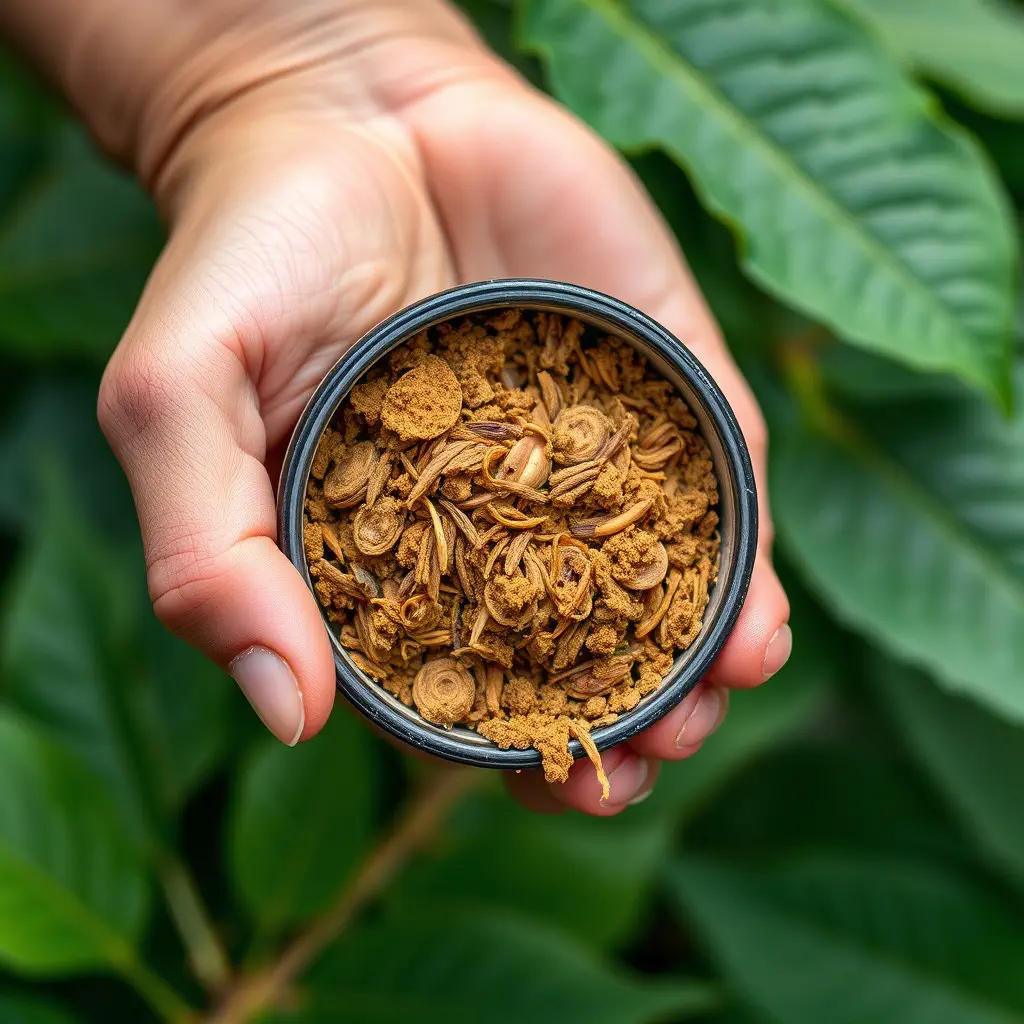Kratom, derived from the Mitragyna speciosa plant, is being explored for its potential benefits in promoting restful sleep and supporting cardiovascular health. The alkaloids mitragynine and 7-hydroxymitragynine in kratom may induce sedative effects that facilitate faster sleep onset and improve overall sleep quality, which is crucial for heart health as it allows for repair during deep sleep phases. These alkaloids also show promise in regulating blood pressure and improving circulation, which can underpin cardiovascular well-being. However, due to the potential for drug interactions and side effects, it's important to approach kratom with caution, especially those with heart conditions or on heart medications. It's advisable to consult healthcare professionals before incorporating kratom into a sleep or health regimen, starting with a low dose to assess personal sensitivity, and monitoring its effects consistently. Ongoing research is necessary to fully understand the effects of kratom on sleep patterns and cardiovascular health to accurately evaluate its potential benefits and risks.
Exploring the multifaceted benefits of kratom, this article delves into its potential role in promoting cardiovascular health through improved sleep quality. Kratom for restful sleep is a burgeoning area of interest, with emerging research suggesting its alkaloids may hold the key to better heart health. As we uncover the intricacies of kratom’s effects on sleep patterns and cardio function, we also navigate the complex regulatory environment surrounding its use. Understanding safe practices for incorporating kratom into your wellness routine can pave the way for enhanced overall well-being, making this a critical read for those interested in the intersection of natural supplementation and heart health.
- Unraveling the Potential of Kratom in Fostering Restful Sleep and Its Implications for Cardiovascular Well-being
- Kratom's Alkaloids and Their Role in Promoting Heart Health and Improving Sleep Quality
- Navigating the Regulatory Landscape and Safe Practices for Using Kratom to Enhance Sleep and Cardio Health
Unraveling the Potential of Kratom in Fostering Restful Sleep and Its Implications for Cardiovascular Well-being

Studies have begun to shed light on the potential role of kratom, a plant-based substance derived from the leaves of Mitragyna speciosa, in promoting restful sleep. Kratom for restful sleep has been a topic of interest due to its alkaloid profile, which includes mitragynine and 7-hydroxymitragynine, both of which have been observed to influence the brain’s opioid receptors. These compounds may contribute to sedative effects that can help individuals fall asleep faster and enjoy a more restful night’s sleep. Adequate sleep is not just about quantity; it’s about the quality of rest one achieves, which is critical for overall health, including cardiovascular well-being. The heart and circulatory system undergo repair and rejuvenation during restful sleep phases, particularly during slow-wave or deep sleep. Therefore, the use of kratom for restful sleep could potentially have a positive impact on cardiovascular health by allowing the heart to operate more efficiently and promoting the body’s natural healing processes. It is important to approach the use of kratom with caution, as it can interact with other medications and may have side effects. Proper dosing and medical supervision are recommended when considering kratom for restful sleep as part of a holistic approach to cardiovascular health. As research continues, it will be essential to understand more about the long-term effects of kratom on sleep patterns and heart health to fully assess its potential benefits and risks.
Kratom's Alkaloids and Their Role in Promoting Heart Health and Improving Sleep Quality

Kratom, a plant native to Southeast Asia, has garnered attention for its potential health benefits, including its impact on cardiovascular well-being and sleep quality. The botanical contains a complex array of alkaloids, with mitragynine and 7-hydroxymitragynine being the most prevalent and studied. These alkaloids are believed to contribute positively to heart health by promoting vasodilation, which can lead to improved blood flow and reduced strain on the cardiovascular system. Preclinical studies suggest that kratom’s alkaloids may support healthy blood pressure levels and enhance overall circulation, which are crucial factors in maintaining a robust cardiovascular system.
Furthermore, kratom’s role in promoting restful sleep is another aspect of its potential health benefits. The alkaloids found in kratom, particularly mitraphylline and 7-hydroxymitragynine, have been shown to influence sleep architecture in a way that supports the attainment of deeper stages of sleep. This effect can be beneficial for individuals experiencing sleep disturbances or insomnia, leading to improved sleep quality and restorative rest. Good sleep is an integral component of heart health, as poor sleeping patterns have been linked to increased risks of cardiovascular issues. Thus, kratom for restful sleep may indirectly contribute to the preservation and enhancement of cardiovascular function through its sedating properties.
Navigating the Regulatory Landscape and Safe Practices for Using Kratom to Enhance Sleep and Cardio Health

When considering the role of kratom in enhancing cardiovascular health, it is imperative to navigate the complex regulatory framework that governs its use. Kratom, a plant from Southeast Asia, has gained attention for its potential effects on sleep quality and cardiac function. The regulatory landscape for kratom varies by country and within regions of the United States, with some areas imposing strict controls while others permit its sale. Users interested in exploring kratom for restful sleep and cardio health benefits should first familiarize themselves with local laws and regulations to ensure compliance and safety. It is also crucial to approach the use of kratom with caution, as it may interact with other medications and can have varying effects among individuals. Safe practices include starting with a low dose to assess personal tolerance, avoiding combining kratom with alcohol or sedatives, and consulting with a healthcare provider before integrating kratom into one’s health regimen, particularly for those with pre-existing heart conditions or who are taking cardiac medications. Monitoring effects and maintaining open communication with healthcare professionals are essential steps in using kratom responsibly to potentially improve sleep patterns and cardiovascular well-being.
Kratom’s potential in enhancing cardiovascular health, particularly through its influence on restful sleep, has been a subject of growing interest. This article has explored the alkaloids within kratom that contribute to heart health and the improvement of sleep quality, offering insights into their combined benefits. While research is ongoing, the evidence suggests that with careful consideration of regulatory frameworks and safe usage guidelines, kratom may be a valuable tool for individuals seeking to promote both restful sleep and cardiovascular well-being. As we continue to investigate this complex relationship, it is clear that kratom’s role in fostering cardiovascular health cannot be overlooked, especially when considering its impact on sleep patterns.






